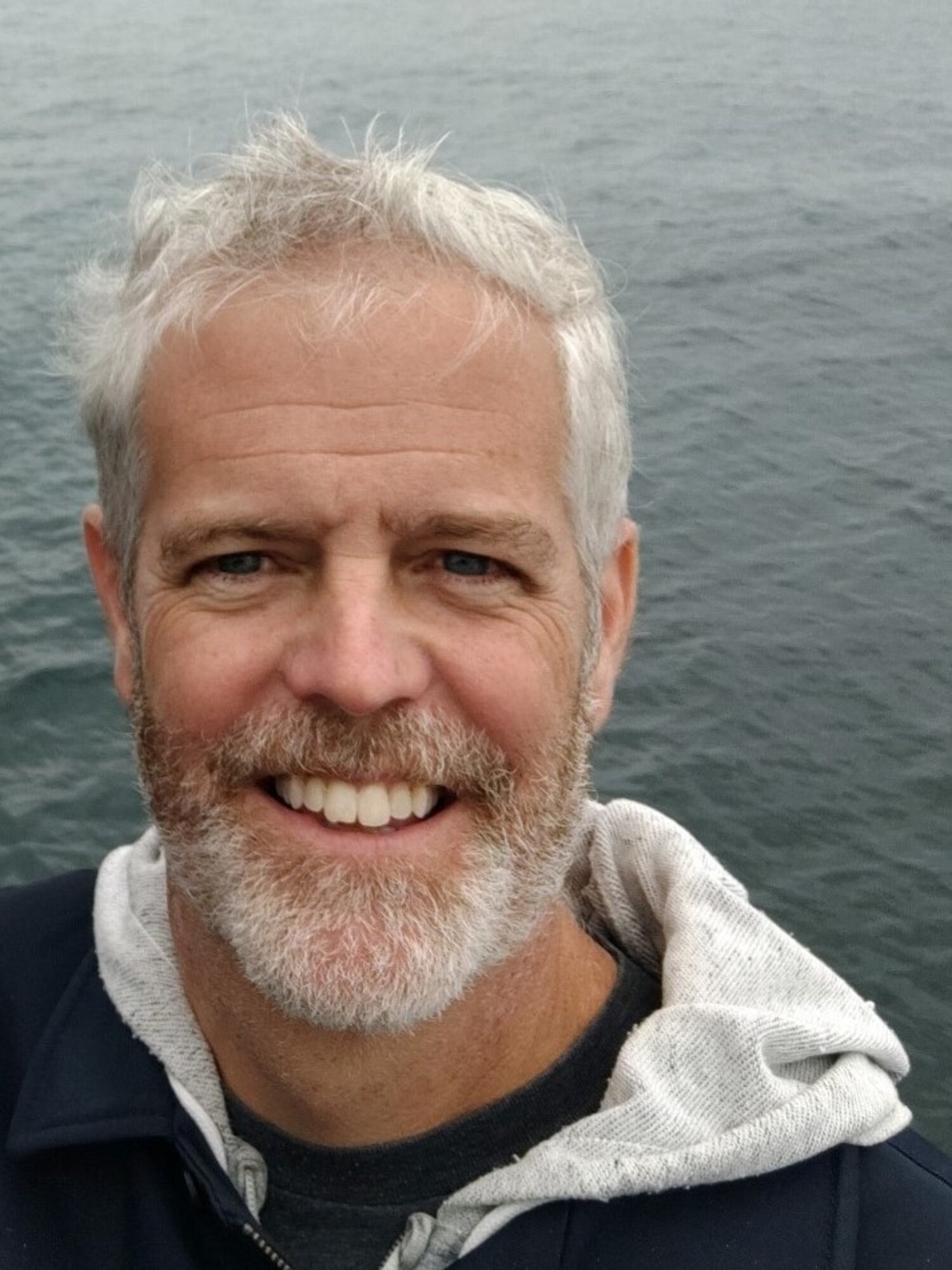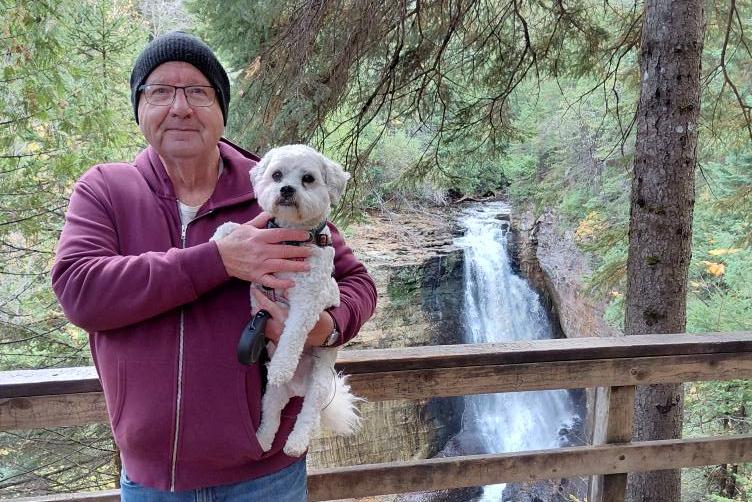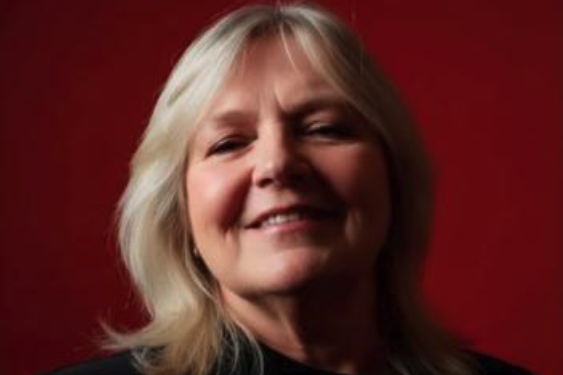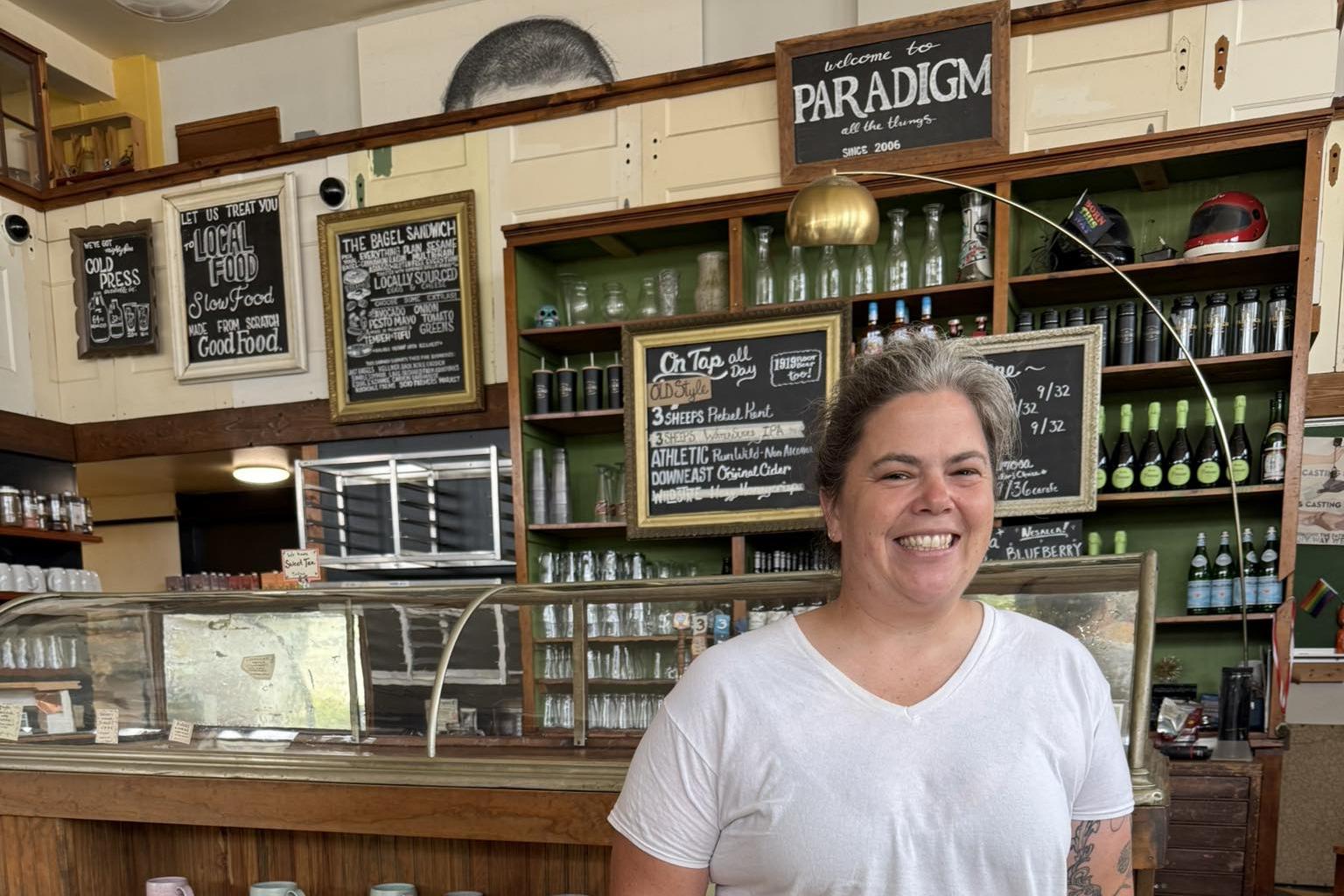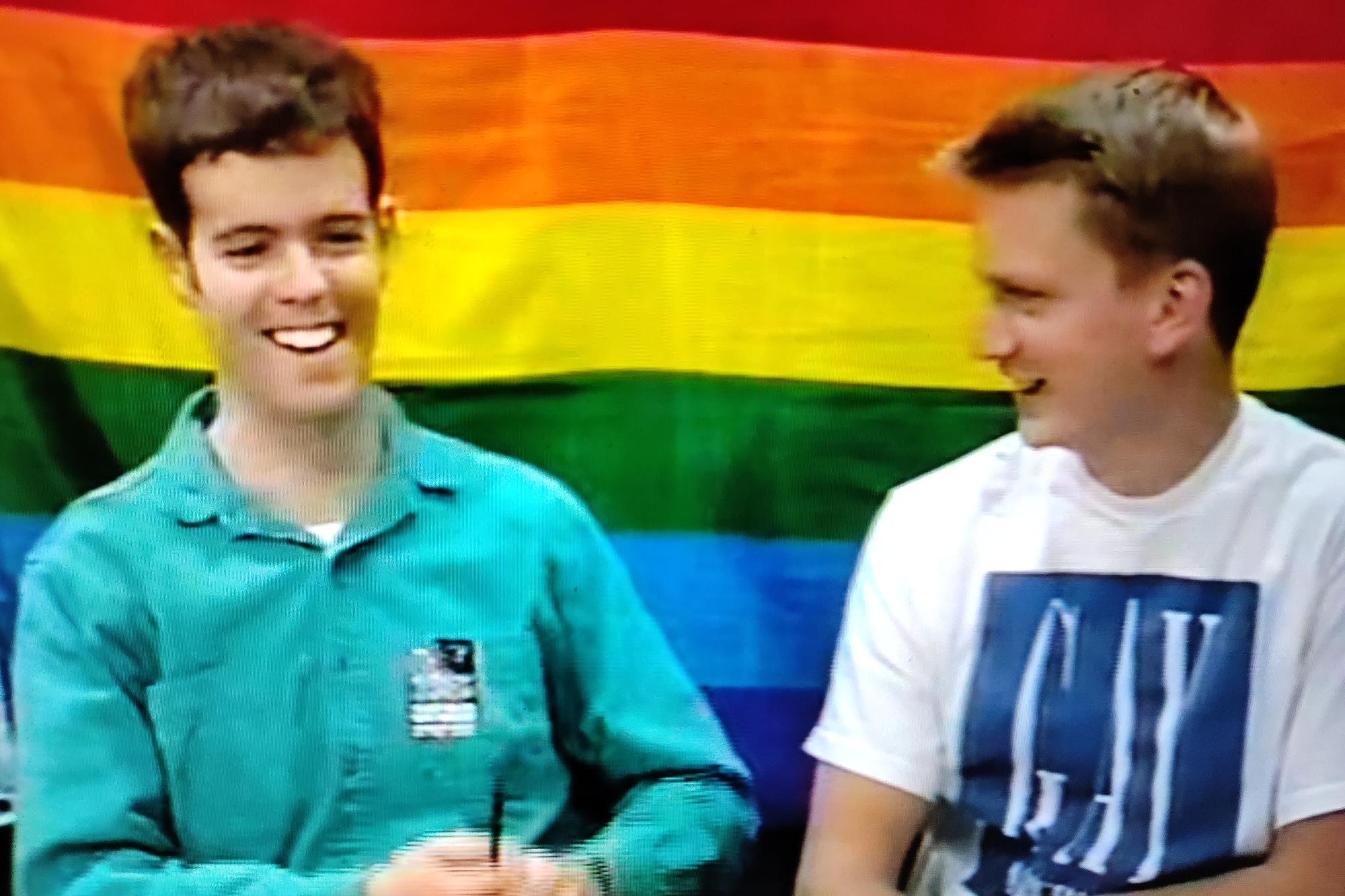
Patrick Flaherty: one small spark can ignite an inferno

Even the smallest spark can ignite a fire. For former Milwaukee gay rights activist Patrick Flaherty, it was a story in a local LGBT publication that sparked his passion for working for change.
“I was reading The Wisconsin Light at the time and seeing how police working at LGBT rights and AIDS demonstrations were wearing rubber gloves out of a misguided fear of AIDS. I took that personally as dehumanizing, and ACT-UP seemed to be the one group not willing to take that treatment, so I sought them out and was deeply involved for the next couple years.”
Patrick attended his first ACT-UP meeting in 1990, where he met the group’s informal leader, Christopher Fons.
“I ended being the only person to show up to the meeting that day, so Christopher caught me up on the group, then invited me nearby to Club 219, for what turned out to be an impromptu first date. He was my first boyfriend for a very brief period.”
Patrick describes that first meeting as his “bug bite,” the start of several years of fighting for gay rights and AIDS awareness and advocacy.
It was Patrick’s brother Kevin who took him to his first gay bar.
“On the same weekend my twin brother came out to me, who was already dating and further along than me, he suggested we go to La Cage. Off we went."
"I ended up getting really anxious and overwhelmed, and left. I am a non-drinker, so bars weren’t as much of a touchstone for me as they were for others, though I did try to organize and turn out the vote at bars, and many bar owners were nice to work with.”
Patrick thinks young people might be surprised to hear that there were actually more LGBTQ bars and organizations at that time than there are today.
“There was no internet back then, so you needed those in-person social groups in order to be able to interact, especially since it wasn’t socially acceptable to be yourself at work and in public at the time,” he explains.
Despite being raised in a conservative, Irish Catholic family, Patrick says his parents and siblings were always very supportive. Patrick remembers, “My mom needed a very short time to get comfortable with the news. She told me, ‘I always knew my kids were perfect, I just had to adjust my idea of what perfect is.’ At the time, [my parents] were both conservative Irish Catholics, but family and principle came first.”
Patrick’s mom and sister accompanied him to his first gay pride parade and his mother became a member of the AIDS Resource Center of Wisconsin, going through volunteer training with him. “That was where we both learned about rimming in the part about safe sex. We never talked about that again!”
When local police tried to use the threat of being outed to his family as an intimidation tactic, the joke was on them.
“I remember in 1992, organizing a demonstration for Dennis Hill at the Racine County Jail, which had mistreated him horribly, and the local law enforcement had gotten wind of the planning."
"I was still a college kid living at home, and the cops tracked me down to my parents’ place and called ahead of the demonstration in what seemed clearly an act of intimidation. My mom got the call and handed the phone to me."
"After the call, my parents agreed that it was a rotten thing of the cops to try to intimidate me in front of my parents. My mom and dad are gone now, but I often get a lift when I think about how lucky and grateful I am to have had them as parents.”
Early career
Patrick’s first job after college was with the AIDS Resource Center of Wisconsin, where he worked from 1993-2001.
“I started off in fundraising events, and it really was inspiring to see all the community support helping with volunteering on events like MAPFest, the AIDS Walk, and Make a Promise. As a young adult, it was terrific to have so many gay and lesbian role models on staff and volunteer committees . . . Louise Searing (an ally) and Jim Schleif, were great first bosses, and even though the work was apolitical, they taught me a lot about organizing by getting volunteers to own responsibility, and work strategically and methodically for months in advance for results.”
Around 1997, Patrick joined the budding effort to create the Milwaukee LGBT Community Center. He was an early board member and was a staff member from 2001 until 2008.
Milwaukee activism: 1999-2009
Patrick’s earliest activism was with ACT-UP, through which he helped to organize the rally for justice for Dennis Hill, a person with AIDS who died shortly after horrible treatment at the Racine County Jail in 1992.
“That rally was a proud moment,” says Patrick. “We always operated on non-violent principles, and there were maybe 20 of us participating in that rally. But the staff at the jail were petrified of us, and the city officials who let Dennis’ death happen felt afraid and anxious. And I imagined that Dennis felt so afraid and powerless in that jail. So it felt gratifying that for a moment, the tables were turned.”
Additional proud accomplishments include:
- Leading the Domestic Partner Registry campaign which resulted in the City of Milwaukee passing a domestic partner registry for same sex couples: “It didn’t confer any rights, but couples who were seeking employer health benefits for their partner could use the registry as eligibility for coverage,” Patrick explains. “After a disastrous 3-14 loss at the Milwaukee Common Council on domestic partner benefits for city workers in 1997, it helped get momentum back for progress.”
- Founding and leading Center Advocates, a 501(c)(4) arm of the Milwaukee LGBT Center (which became Equality Wisconsin in 2008 when the Center ended its advocacy efforts): “Center Advocates also had a PAC for a period that organized some of the largest LGBT fundraisers for candidates at that time.”
- Leading the passage of domestic partner benefits for City of Milwaukee employees in 2001: “We took a page from Mayor Norquist, who opposed the first attempt in 1997, saying such a campaign should come from the city employee union. It was a dodge, but also a challenge. We knew a lot of gay, lesbian and allied city workers, and had them raise the issue up through their locals. The union fought for it, and we got the council and the mayor to support it, too. Ironically, the original proposal limited the benefits to same-sex partners with the logic that straight employees could access benefits for their spouse through marriage, which was still denied to gay couples. But Common Council President Marvin Pratt, who was a supporter of both the 1999 registry and the 2001 benefits, wanted it to extend to unmarried opposite sex partners, too, so it was sent back and expanded. I like to joke that it was the first time in the history of management/labor negotiations where management held out until more workers got benefits. It was nice hearing from people telling me how getting access to health care via the measure helped their family.”
- Cofounding the 2006 Fair Wisconsin campaign: “While the $5 million campaign didn’t stop the state constitutional ban on marriage for gay and lesbian couples, it did foster hundreds of thousands of conversations with ordinary voters on our fundamental humanity. Multiplied by similar state votes across the country from 2004-2012, the religious right did us a favor by winning the battle but losing the war for marriage equality.”
- Securing a recurring Wisconsin budget item (c. 2007) with modest funding to the Milwaukee and Madison LGBT Centers: “My original plan was to include the Eau Claire and La Crosse Centers, but there apparently wasn’t an appetite in government to include them. Governor Doyle’s office wasn’t helpful, and Assembly reps struggled, but Senator Tim Carpenter got it done. Today, I understand that the Milwaukee share now goes to Diverse and Resilient. Governor Doyle was a moderate supporter of LGBT rights. He was vocally opposed to the marriage ban, and when the Assembly and Senate were Democratic, passed a statewide domestic partner law in 2009 with significant rights (I was away in grad school during this time and not in leadership of the effort). He even appointed Kevin Flaherty, my openly gay twin, to a state board. But his administration cut anti-violence funding to the Milwaukee LGBT Community Center when it took over a grant-making program formerly administered by the State Attorney General, and he opposed an executive order banning discrimination on the basis of gender identity for state employees.”
- Winning the addition of gender identity to Milwaukee’s equal rights ordinance in 2007.
- Nearly becoming the first openly gay alderman in Milwaukee on April 1, 2008, falling about 70 votes short in depressed turnout.
Mentors
Patrick says he has had a lot of great mentors who have become lifelong friends:
People like Christopher and Dan Fons, who demonstrate always doing the right thing without fear. My friend Bill Dempsey, who was already working as a community organizer, was the first to teach me that strategy comes first, then tactics. He helped me understand that we have to unlearn the impulse to take random actions without first being clear about what we want, who has the power to give us that, and what tactics can be brought to bear to persuade the decision maker. It sounds and is simple, but I’m amazed to this day how often even large moneyed interests just throw a bunch of uncoordinated tactics and hope for the best. Bill was also one to help me not confuse self-expression with activism. Don’t get me wrong, a big part of a liberated LGBT movement is the cultural freedom to be, dress, talk, walk however you want. But if you are trying to win something concrete for your community like a new law or funding for your program, self-expression can be a distraction from the clear-eyed approach to winning something measurable.
By the late 1990s, as I got more involved in the marriage equality movement, Bill introduced me to Dave Fleisher, who was working at NGLTF at the time. Dave was great at teaching LGBT activists to move beyond trying to be one-person armies, to building a team that could become a movement. He also had an emphasis on taking the LGBT rights message straight to the voters rather than merely relying on friendly media or paid ads to win the day. While leading the Milwaukee LGBT Center’s advocacy arm, known as Center Advocates, we had up to 100 volunteers out in a day, and I believe that day we identified 2,000 voters supportive of same-sex couples and against the marriage ban.
Kathleen Mulligan Hansel is someone who modeled in a way I was never able to emulate how to give legislative testimony, and how to brief legislators. Julia Kleppin and Elizabeth Dahlk modeled to just get in there and do the work, and keep coming back without fanfare or praise.
I was arrested 3 times during my young adulthood doing LGBT and AIDS activism, twice in Milwaukee and once in Maine. I was married last year and a lot of the key people there to celebrate with me were with me at each arrest. If you want to make lifelong friends, get arrested with them!
Current Life
Patrick now resides in Silver Spring, Maryland, near Washington D.C. Patrick received his MPA in Health Policy from Columbia University in 2010 and currently works in government health policy. In September of 2023, he married his partner of 13 years, Alphonso Jackson. “Marriage wasn’t an option early in our relationship, and one day we realized that we should make it official,” he jokes.
Although he lives a decidedly quieter life these days, Patrick continues to be an advocate for gay rights. In 2012, he was active in the campaign to legalize same-sex marriage in Maryland and has been active in presidential campaigns since 2000 as a grassroots volunteer.
Patrick says he worries about what he describes as the “hollowing out” of advocacy organizations after marriage equality was won. He hopes that LGBTQ+ rights advocates stay organized and active since gay rights are always being threatened. He points to the culture war against transgender people as current issue that needs support.
“Everyone is busy, and there are a lot of great causes inside and outside of the LGBTQ community. But support your local community and stay active.”
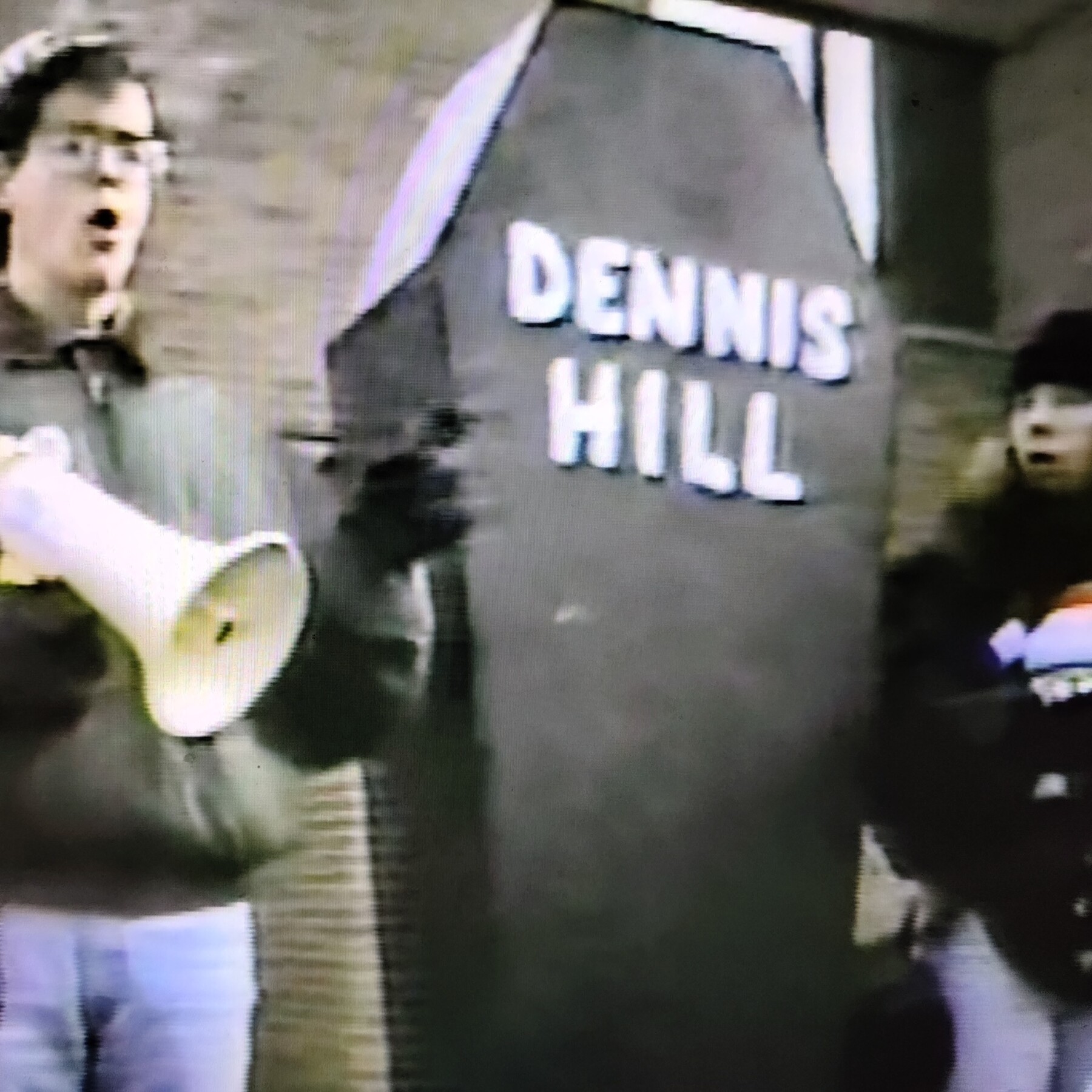 Patrick, protesting the inhumane treatment of prisoner Dennis Hill. (1992)
Patrick, protesting the inhumane treatment of prisoner Dennis Hill. (1992)
recent blog posts
January 17, 2026 | Garth Zimmermann
January 16, 2026 | Michail Takach
January 10, 2026 | Michail Takach
The concept for this web site was envisioned by Don Schwamb in 2003, and over the next 15 years, he was the sole researcher, programmer and primary contributor, bearing all costs for hosting the web site personally.
